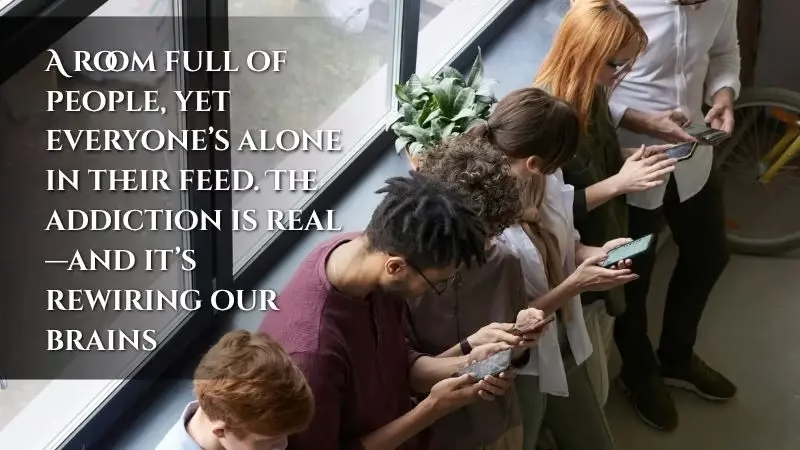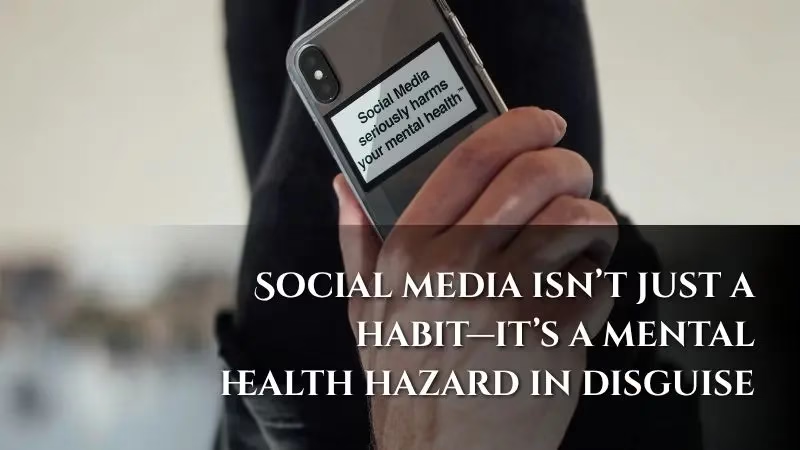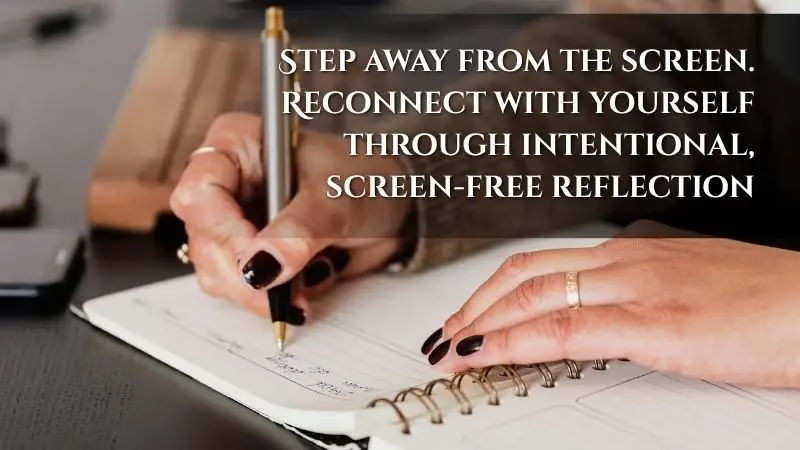Table of Contents
The Age of Social Media
In the digital era, platforms like Facebook, Snapchat, TikTok, Twitter (X), and Instagram are lifestyles rather than simply applications. Worldwide, over 4.95 billion people are active internet users; over 62% are on social media daily. Given our 2.5-hour daily average scrolling, it is not unexpected.
Though social-media enables us to stay informed and connected, many miss a more sinister facet. Studies today confirm what many have long suspected: social-media can negatively impact mental health, especially if used excessively or without awareness.
The Psychology Behind the Scroll
Why do we scroll even when we don’t want to? Social media tools are designed to be addictive. These programs take over our brain’s reward system with their constant feeds, push notifications, likes, and comments. Every comment or like delivers a dopamine hit, therefore establishing a cycle challenging to interrupt. The changeable rewards of social-media—like slot machines—psychologically prohibit stopping without will.
How Scrolling Affects Your Mental Health
Anxiety and Depression
Limiting social media to 30 minutes per day substantially lowers anxiety and depression levels, as numerous studies—including one from the University of Pennsylvania—have demonstrated.
Why? Comparing your real life to someone else’s highlights reel might make you feel you are not doing enough or missing out.
“Social media creates a lens where everyone’s life looks better than yours—even if that’s not true,” says Dr. Jean Twenge, psychologist and author of iGen.
FOMO (Fear of Missing Out)

Even if you are completely content in your present, seeing friends share about trips, celebrations, or successes can start feelings of exclusion.
FOMO leads to:
- Increased stress and irritability
- Restlessness
- A compulsive need to stay connected
Self-Esteem and Body Image Issues
Instagram and TikTok are well-known for advancing impossible beauty standards. With curated content, photo editing tools, and filters, what you observe is seldom what is real.
A Royal Society for Public Health study finds:
- Particularly among adolescent girls, Instagram is the worst social-media platform for mental health.
- 70% of users report feeling worse about their body image after scrolling.
Sleep Disruption
Using screens late into the night suppresses melatonin production, making it harder to fall asleep. On top of that, doomscrolling can trigger anxious thoughts, keeping your mind racing.
Sleep deprivation impacts:
- Mood stability
- Concentration
- Decision-making
- Overall mental resilience
Addiction and Dopamine Loops
Ever tried to put your phone down and failed?
That’s because social-media addiction is real. Like other forms of addiction, it changes your brain chemistry, creating dependency.
Common signs include:
- Checking your phone first thing in the morning
- Feeling anxious when you can’t access Wi-Fi
- Getting upset over lack of engagement (likes/comments)
Signs You Need a Digital Detox

Not sure if you need a break? Here are red flags that scream “Detox Needed”:
- Constantly comparing yourself to others
- Mood swings after using social media
- Decreased productivity and attention span
- Feelings of loneliness despite online “connections”
- Physical symptoms like eye strain, headaches, or fatigue
If any of these feel familiar, it’s time to reclaim control.
What Exactly Is a Digital Detox?
A conscious break from electronic devices—especially social-media—known as a digital detox aspires to improve your emotional and mental health. It does not always mean permanently deleting all of your applications. It’s about setting standards appropriate for your mental health goals and way of life.
Benefits of Taking a Break from Social Media
✅ Improved Mental Clarity
Without the constant noise, your brain can finally rest and focus.
✅ Better Sleep
Reducing screen time, especially before bed, leads to deeper, more restorative sleep.
✅ Boost in Productivity
Without the digital distractions, you’ll be amazed how much you can accomplish.
✅ Deeper Real-Life Relationships
You start to connect more meaningfully with people around you.
✅ Increased Self-Worth
You stop measuring your value in likes, followers, or views.
How to Start Your Digital Detox Journey
Step 1: Set Your Intention
Ask yourself:
- Why do I want a digital detox?
- What do I hope to gain from it?
Set clear goals like:
- “I want to reduce my anxiety.”
- “I want to sleep better.”
- “I want to reconnect with the real world.”
Step 2: Audit Your Screen Time
To see where your time goes, use your phone’s built-in screen time tracker or apps like RescueTime, Moment, or Digital Wellbeing. Once you spot time-wasters, get rid of them or restrict them by use of app blockers.
Step 3: Remove Triggers and Distractions
- Turn off non-essential notifications
- Move social apps off your home screen
- Use grayscale mode to make apps less appealing
Step 4: Replace Scrolling with Healthy Habits

Instead of reaching for your phone:
- Journal or write affirmations
- Read a book or listen to a podcast
- Go for a walk or exercise
- Meditate or practice breathing exercises
- Call a friend or family member
Real-Life Digital Detox Success Stories
Sarah, 29 – Marketing Manager
“I used to wake up and scroll through Instagram for an hour. My self-esteem was in the gutter. I deleted all apps for 30 days and started journaling instead. I now feel grounded and much happier.”
Ravi, 22 – Student
“I was constantly anxious and procrastinating on schoolwork. I did a one-week digital detox and studied offline. My grades went up and so did my confidence.”
Tools and Apps to Help You Unplug
| App Name | Function | Platform |
| Freedom | Blocks websites & apps | iOS, Android, Web |
| Offtime | Limits phone usage | Android |
| Forest | Gamifies staying offline | iOS, Android |
| Digital Wellbeing | Tracks screen habits | Android |
| Screen Time | iPhone screen usage control | iOS |
The Future of Social Media and Mental Health
Social media isn’t going anywhere—but how we use it must evolve.
- Rise of “mindful tech” movements
- More platforms introducing time-limit features
- Growing awareness of mental health boundaries
- Offline meetups and communities promoting real connection
Influencers and creators are also starting to speak out about their mental health struggles, opening the door to authentic online experiences.
Final Thoughts: Reclaiming Control Over Your Mind
Though social-media was meant to bring us together, too frequently it separates us—from each other as well as from ourselves.
A digital detox is about intentionally living, emotional tranquility, and mental clarity, not about refusing technology.
You don’t need to leave the grid. Even little adjustments like notifications being turned off or a weekend vacation can have a major effect on your emotional condition and mood.
Take control. Unplug. Reconnect—with what really matters.
FAQs About Digital Detox
Q1. How long should a digital detox be?
Start with 24–72 hours. Gradually extend to a week or longer depending on your comfort.
Q2. Is deleting social media necessary?
Not always. You can start with logging out, muting, or setting daily time limits.
Q3. Can a digital detox improve relationships?
Yes! More eye contact, better conversations, and deeper emotional presence.
Q4. What’s the best time for a detox?
Weekends, vacations, or any period where stress is high and connection is low.
Call to Action:
Ready to take your first step toward a healthier mind?
👉 Challenge Yourself: Try a 3-Day Digital Detox!
Comment below with your experience or tag us on your journey using #MyDigitalDetox after you’re done!


1 thought on “7 Shocking Ways Social Media Is Damaging Your Mental Health and Why You Desperately Need a Digital Detox”